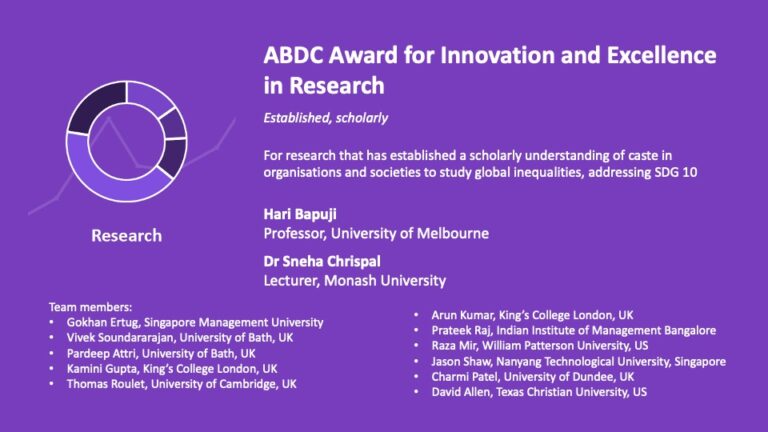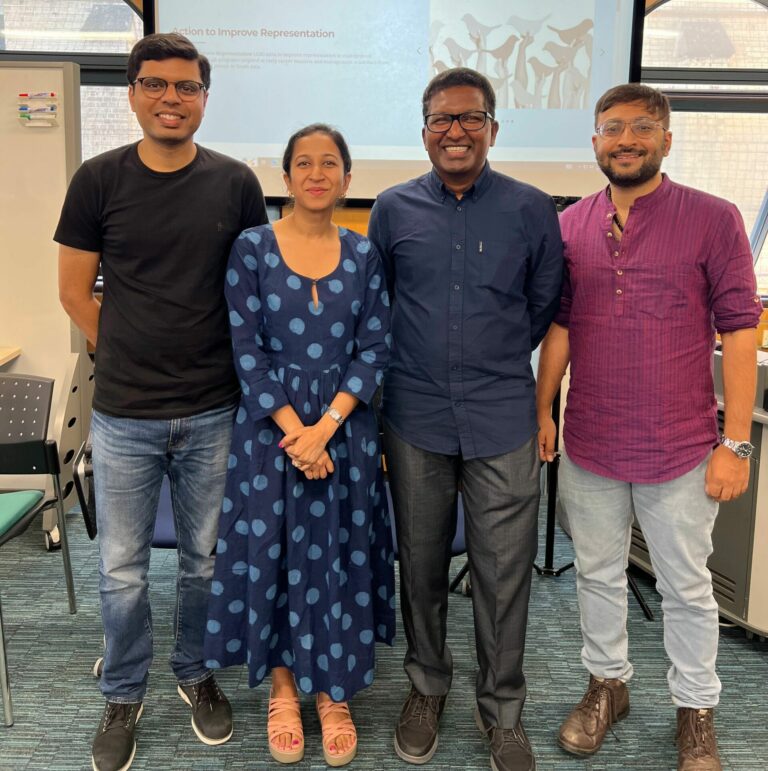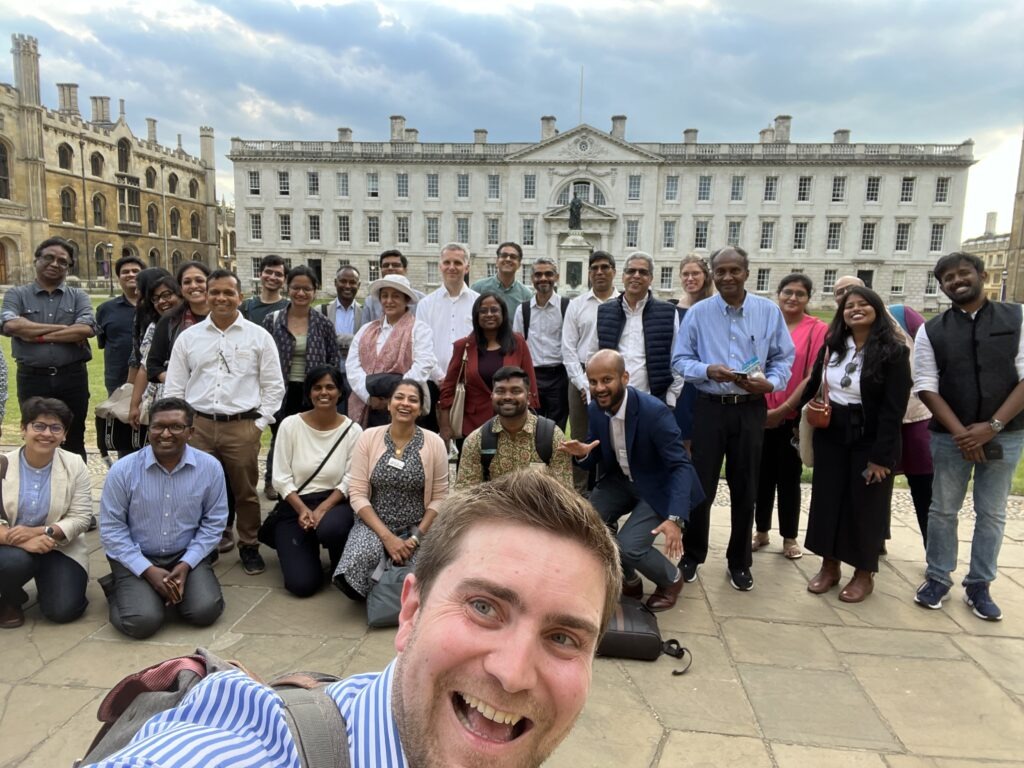2024 Network Awards – Established, Scholarly Research

Winner:
Hari Bapuji
Professor, University of Melbourne
Dr Sneha Chrispal
Lecturer, Monash University
Judges’ comments
This comprehensive research program has produced outcomes, including 16 articles in top-tier journals, media pieces, and presentations to community stakeholders. Through collaboration across the research program, the researchers have supported the development of early-career, female, and underrepresented academics in Australia, the UK, and India. The research has also shown strong policy influence, including policies adopted by the Melbourne City Council and the Australian Human Rights Commission.
The initiative
This research addresses the Sustainable Development Goal of reducing inequalities, with two interrelated aims: (i) establish a scholarly understanding of caste in organisations and societies; caste affects over two billion people in South Asia and around the world, including 300 million “untouchables” and 100 million Indigenous Peoples, and (ii) develop caste as a theoretical lens to study global inequalities.
Since 2020, this research has resulted in significant outputs, including 20 journal articles (10 ABDC A*, 6 ABDC A), five journal special issues (2 ABDC A*, 3 ABDC A), two book chapters, two teaching cases (with teaching notes), six media articles, three podcasts, and 19 invited presentations to universities and stakeholders. This research, not funded by any grants, is led by Hari Bapuji in collaboration with over 20 scholars (most of whom are early career, female and underrepresented academics) based in Australia, UK, and India.
Significantly, this research has:
- Diverted the attention of management scholars to the ethical implications of caste and provided a foundation for future research by clarifying the organizational manifestations of caste and their mechanisms and outcomes.
- Enhanced scholarly understanding of inequalities by using a caste lens to (i) explain economic inequality and migration outcomes, and (ii) expand conceptual boundaries of inequalities and stigma to include “invisible inequalities” and “institutional stigma”, respectively.
- Provided empirical evidence of economic inequalities due to caste and their aggravation via social capital and alleviation via human capital.
- Developed guidance to address caste through practice and policy as well as management education.
How it was undertaken
This research simultaneously adopted three distinct approaches – theory development, empirical testing, and community building, to establish caste and inequalities as vibrant research streams.
First, to help scholars to study caste, we wrote agenda-setting conceptual articles and systematic review articles by synthesizing the extant research across disciplines.
Second, we conducted quantitative and qualitative empirical studies to examine income inequalities and the mechanisms to address them. As one example, we showed evidence of income gaps faced by institutionally stigmatized “untouchable” business owners where social capital aggravates the income gaps for them, while it alleviates for other marginalized groups. This study received wide media coverage, with over 10 news articles in all major newspapers in India.
Third, we nurtured a community of scholars through leadership activities, including conducting symposiums at leading conferences, guest editing special issues at leading journals, organizing conference tracks, and initiating specialized conferences on the theme (University of Cambridge in 2023, University of Bath in 2024, attended by over 70 scholars).
The above three approaches helped develop caste and inequalities as vibrant areas of inquiry. A search in Web of Science (WoS) reveals (i) a total of 171 contributions on caste, which accumulated a total of 1,969 citations. Of these, recent period (since 2018) accounted for most articles (53%) and citations (85%), and (ii) a total of 813 contributions on inequality, which accumulated a total of 12,334 citations. Of these, recent period (since 2018) accounted for most articles (60%) and citations (86%).
Academic outcomes
This research made an impact on scholarly discourse as well as practice and policy.
Scholarly Impact. Citation analysis on WoS reveals that Bapuji is the most-prolific and most-cited researcher on the topics of inequality (among 1,822 authors) and caste (among 325 authors). Specifically, 10 publications on inequality published by Bapuji since 2015 have received a total of 545 cites (4.8%) of the 11,383 citations during the same period; Eight publications on caste since 2020 have received a total of 157 citations (i.e., 11%) of the 1,438 citations during the same period. Additionally, this research received high Altmetric Attention Scores (10 papers in the top 5% of all outputs).
External Awards and Recognition. This research has received several awards and commendations, such as two best paper awards at the Academy of International Business conference, two papers as runners-up for the Financial Times Responsible Business Education Awards 2022, two nominations by Ivey Publishing for the Best Case Award, and inclusion of papers in editors’ collections.
Further, several papers were among the most-read and most-cited in their respective journals. Further, Bapuji was included in the #ThinkList of University of Bath, which recognizes influential scholars who promote responsible business research and education.
Policy Influence. Recently, Melbourne city council included combating caste discrimination in its “Inclusive Melbourne Strategy Action Plan 2024-26” (Bapuji served as a consultant). Further, in collaboration with his colleagues, Bapuji made a submission to the Australian Human Rights Commission, which included caste in its 2022 National Anti-Racism Framework Scoping Report.
Research collaborators
- Sneha Chrispal, Monash University, Australia
- Gokhan Ertug, Singapore Management University
- Vivek Soundararajan, University of Bath, UK
- Pardeep Attri, University of Bath, UK
- Kamini Gupta, King’s College London, UK
- Thomas Roulet, University of Cambridge, UK
- Arun Kumar, King’s College London, UK
- Prateek Raj, Indian Institute of Management Bangalore
- Raza Mir, William Patterson University, US
- Jason Shaw, Nanyang Technological University, Singapore
- Charmi Patel, University of Dundee, UK
- David Allen, Texas Christian University, US
- Bala Vissa, INSEAD, Singapore
- Charlene Zietsma, University of Michigan, US
- Chetan Joshi, Indian Institute of Management Calcutta
- Christina Dhanuja, DEI Consultant, India
- Dolly Kikon, University of California, Santa Cruz, US
- Fahreen Alamgir, Monash University, Australia
- Garima Sharma, American University, US
- Kanika Meshram, University of Melbourne
- Rahul Kamble, Institute of Rural Management Anand, India
- Ritesh Kumar, Fr. Agnel Business School, India
- Saneesh Edacherian, University of Birmingham, Dubai


